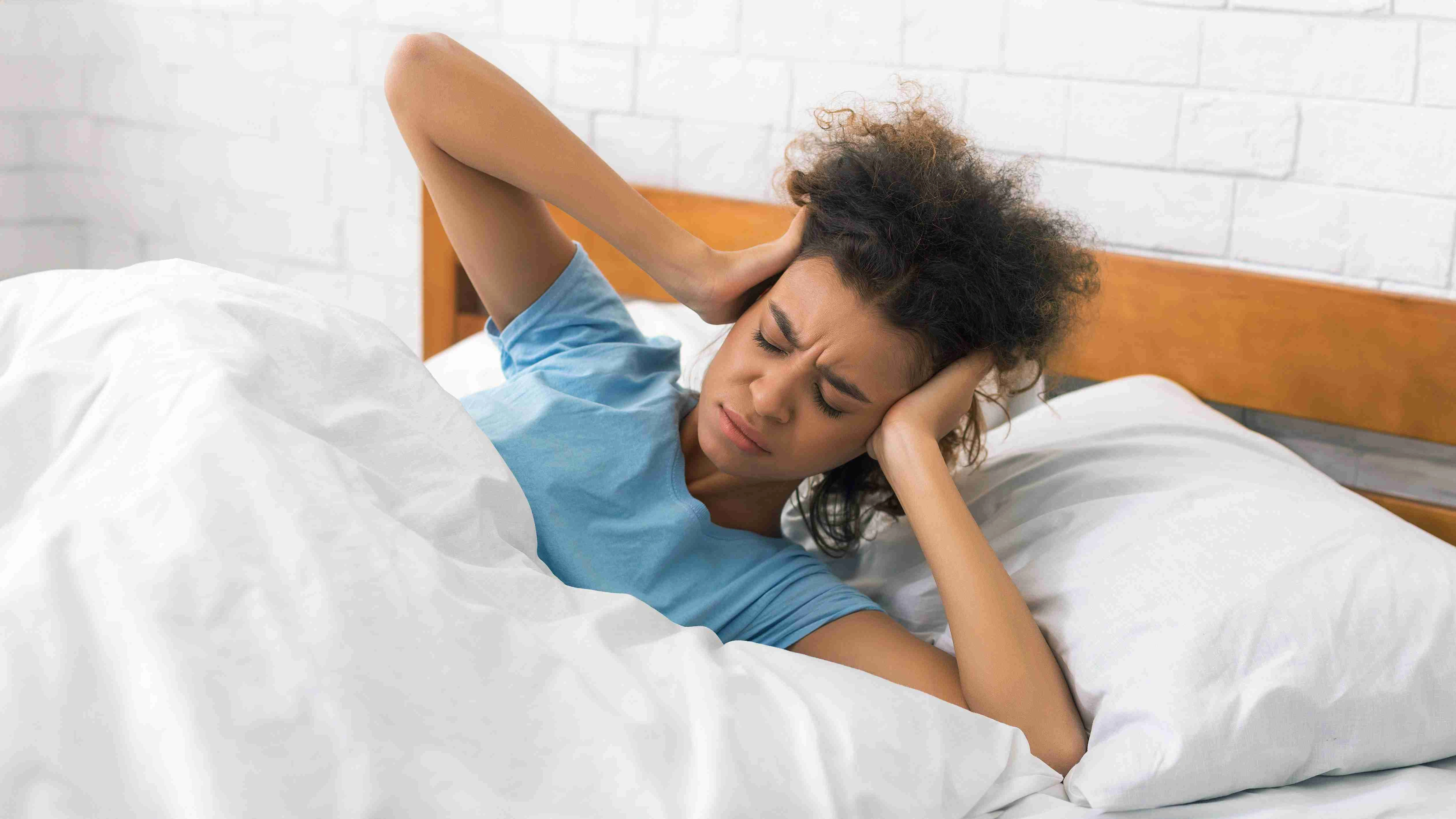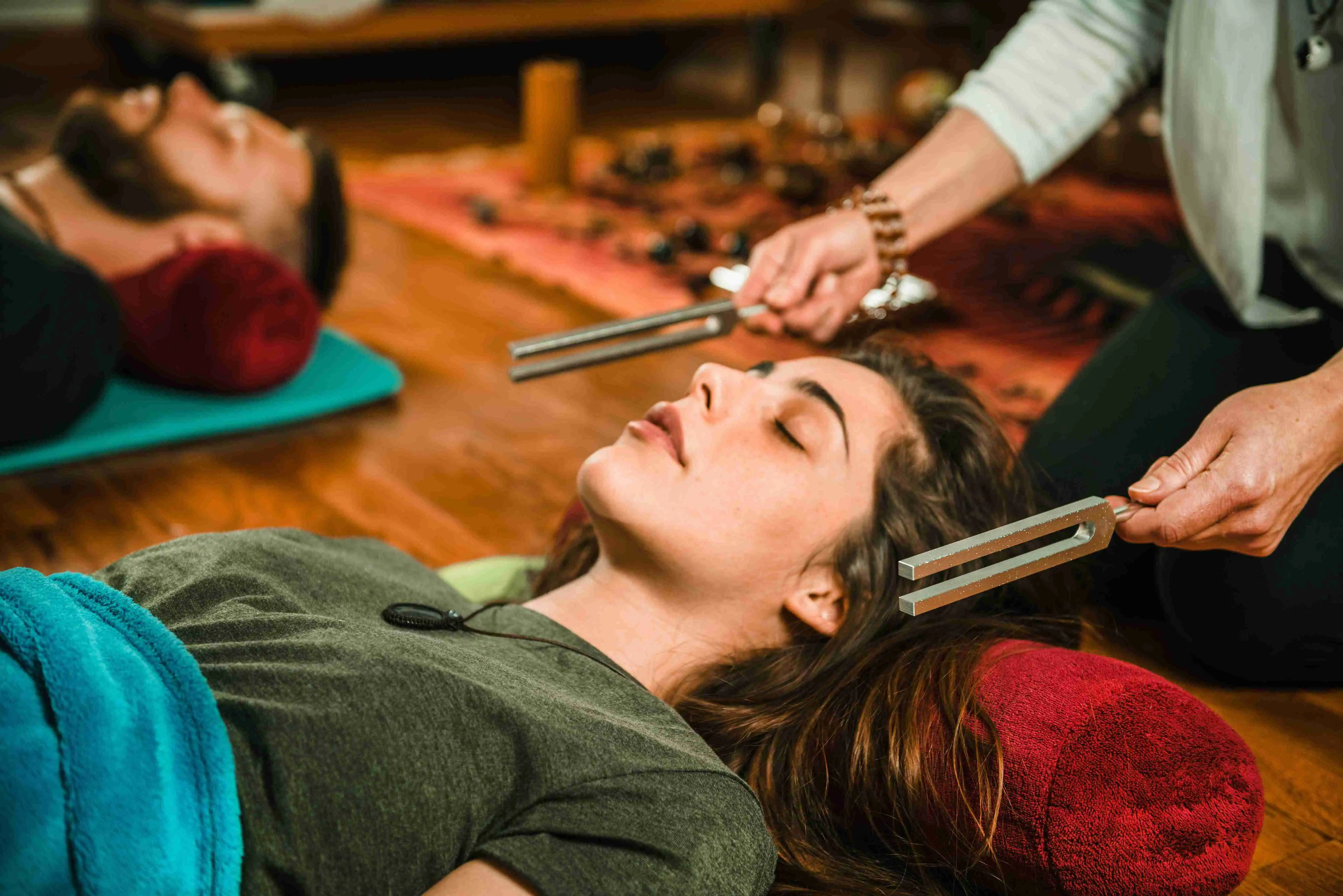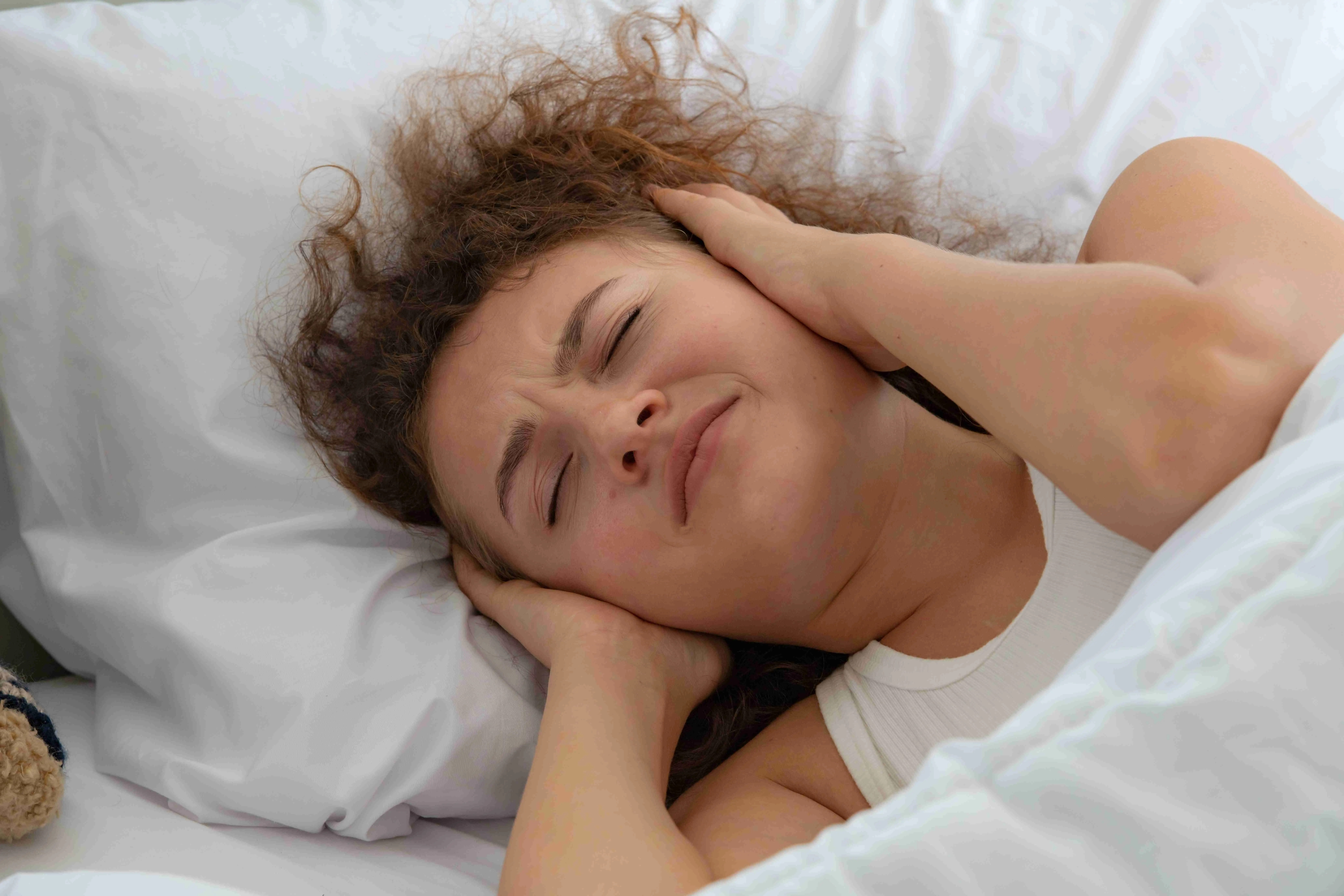Sleep is essential for overall wellness, serving as a foundation for both mental and physical health. People with tinnitus experience persistent ear ringing and buzzing, which transforms peaceful nights into frustrating nighttime wakefulness.
This article explores the essential aspects of tinnitus, explaining its causes, symptoms, and the daily challenges it brings. With a clear understanding of these elements, we then focus on offering practical strategies designed to improve your sleep despite tinnitus. Our goal is to provide you with the knowledge and actionable solutions to manage tinnitus effectively at night, enhancing your ability to achieve deep, restful sleep.
Understanding Tinnitus
Tinnitus can greatly affect daily life, and its influence is especially noticeable during quiet moments, such as at night.
Common Causes of Tinnitus
Tinnitus is not a disease but a symptom of underlying conditions or exposures. Understanding its causes can help in targeting treatment and management strategies:
- Exposure to Loud Noises: A long period of exposure to loud noises results in inner ear hair cell damage, thus causing tinnitus. Working in loud surroundings or listening to music without hearing protection causes this condition to appear frequently for people.
- Age-Related Hearing Loss: As individuals grow older, they might encounter presbycusis or hearing loss linked to aging, frequently accompanied by tinnitus as a symptom.
- Medical Conditions: Tinnitus can be caused by ear-related conditions such as TMJ disorders, ear infections, and chronic diseases such as high blood pressure.
- Certain Medications: Multiple prescribed medications, including aspirin, specific antibiotics, and cancer medicines, result in tinnitus as one of their side effects.
- Head or Neck Injuries: Tinnitus can develop when traumatic head or neck injuries damage either the auditory nerves or the hearing pathways within the brain.
- Neurological Disorders: Conditions impacting the brain's auditory regions, such as multiple sclerosis (MS), may also present tinnitus as a symptom.
Symptoms of Tinnitus
The symptoms of tinnitus can differ greatly, making diagnosis and treatment more challenging. They include:
- Headaches: Frequently occur alongside tinnitus, particularly if associated with stress or tension.
- Dizziness: Certain forms of tinnitus affect structures within the inner ear, resulting in dizziness or vertigo.
- Ringing in the Ears: The defining symptom of tinnitus, perceived as ringing, buzzing, hissing, or humming noises.
- Difficulty Concentrating: The ongoing noise can interfere with concentration and make it difficult to engage in tasks.
How Tinnitus Affects Sleep

Sleep ought to be a moment of relaxation and recovery, yet for individuals with nighttime tinnitus, it frequently becomes a time of heightened discomfort. Recognizing how tinnitus affects sleep and why it frequently worsens at night can assist individuals in managing this condition more efficiently.
Why Tinnitus Gets Worse at Night
Multiple factors lead to the belief that tinnitus intensifies during the night, hindering the ability to fall asleep and remain asleep:
- Reduced Background Noise: Environmental noises throughout the day can help conceal the sound of tinnitus. However, at night, these noises lessen, making the tinnitus more apparent and annoying.
- Increased Focus on Tinnitus: With reduced distractions and activities during the night, there is a greater chance to concentrate on the ringing or buzzing noises, heightening awareness of tinnitus and discomfort.
- Relaxation Paradox: Although relaxation is crucial for sleep, for individuals with tinnitus, it can ironically heighten their awareness of symptoms. When the body relaxes, the central nervous system may become less capable of disregarding insignificant sounds, making the tinnitus more noticeable.
- Changes in Ear Pressure: The pressure within the ears can change when lying down for some individuals, which can lead to increased tinnitus symptoms.
- Sleep Deprivation and Stress: Continuous sleep deprivation can increase stress and anxiety, which can then exacerbate tinnitus, leading to a harmful cycle of sleep disturbance and heightened symptoms.
Sleep Disorders Associated with Tinnitus
While tinnitus doesn't directly lead to sleep disorders, it intensifies and complicates current sleep conditions that already exist. Understanding the mutual relationship between tinnitus and different sleep disorders is vital because poor sleep often worsens tinnitus perception, which forms an ongoing cycle affecting health and quality of life.
- Insomnia: Tinnitus worsens the ability to fall asleep and stay asleep, which leads to insomnia. The continuous noise can keep the mind alert, hindering the relaxation needed for sleep.
- Sleep Fragmentation: People with tinnitus frequently suffer from disrupted sleep, awakening several times at night because of disturbing noises that interrupt the natural sleep pattern and lower sleep quality.
- Sleep Apnea: Tinnitus and sleep apnea frequently coexist, intensifying challenges related to sleep. Sleep apnea interferes with breathing, causing frequent awakenings throughout the night. These disturbances can heighten the awareness of tinnitus, intensifying the feeling of its severity.
- Delayed Sleep Phase Disorder (DSPD): Tinnitus can make it difficult to fall asleep at a regular time, which may worsen or contribute to Delayed Sleep Phase Disorder (DSPD), where a person's sleep is significantly delayed and doesn't match societal norms.
- Anxiety and Depression: Both anxiety and depression are frequently experienced by individuals with tinnitus, contributing to sleep disorders. These conditions can intensify the awareness and distress related to tinnitus during the night, making it more difficult to fall asleep and creating a harmful cycle of sleeplessness and emotional distress.
- Fatigue: Persistent sleep disturbances caused by tinnitus frequently result in daytime fatigue, which can intensify the experience of tinnitus, additionally affecting cognitive abilities and emotional health.
How to Sleep Better with Tinnitus

Addressing sleep issues related to tinnitus requires personalized strategies that not only help manage the condition but also improve the overall sleep environment, allowing for deeper and more restorative sleep.
Sound Therapy

White noise machines provide continuous background noise at a controlled sound volume, including ambient noise at a controlled volume, effectively masking the noises produced by tinnitus.
Additionally, the continuous background sound created by a fan, humidifier, or dishwasher can also help reduce the severity of tinnitus sounds, assisting the brain in ignoring them.
Consider playing nature sounds, including rainfall, ocean waves, and forest ambiances, to achieve a soothing effect and engage in effective sound masking, shifting your attention away from tinnitus perceptions.
Choose a Suitable Pillow
Choosing a suitable pillow remains essential because it provides support for the neck and can diminish tinnitus symptoms. Ergonomic pillows that provide proper spinal alignment might reduce both the discomfort of tinnitus and possible additional symptoms caused by it.
People who gain benefits from sound therapy can use pillows with built-in audio features. The built-in speakers in these pillows deliver soothing sounds for proper sound therapy without creating any noise disturbance to other people.
Selecting a Mattress and Bedding
Selecting suitable mattress and bedding materials is crucial for enhancing sleep quality because it directly helps people with tinnitus disorders improve their rest.
Memory foam mattresses provide perfect weight distribution that creates better sleep postures while removing pressure points from the body.
Breathable bedding materials should be selected because they help regulate body temperature, which reduces the risk of tinnitus symptom intensification at night.
Sleep in a Comfortable Position
Try different sleeping postures to determine which position might minimize your tinnitus symptoms. Pillow elevation is a useful technique that can help reduce ear pressure and alleviate tinnitus.
People may also achieve temporary relief from tinnitus symptoms by laying their unaffected ears toward their pillow surface. Changing your sleep position may serve as a major source of relief and produce calmer night rest.
Sleep Hygiene Tips
Proper sleep hygiene is an important factor in controlling tinnitus symptoms. Create a bedtime routine consisting of relaxing practices such as reading, taking warm baths, or performing gentle stretching movements, which will signal your body that it is time to rest.
Your sleeping environment needs to be specifically prepared for rest by using blackout curtains to eliminate light exposure and control room temperature to ensure comfort.
Reduce Stimulant Use
You should limit your consumption of stimulants, including caffeine and nicotine, before bedtime. The consumption of stimulants will intensify your tinnitus symptoms and make it difficult to get to sleep.
Diminishing your consumption of these substances minimizes their effects on your sleep quality as well as your tinnitus symptoms.
Manage Stress and Anxiety Before Bed
It is essential to effectively manage stress and anxiety during bedtime to control tinnitus symptoms. Performing relaxation techniques such as guided imagery, meditation, and deep breathing exercises can calm your mind and divert your thoughts from tinnitus during bedtime, aiding stress reduction.
Exercise Regularly
Regular physical exercise provides health benefits that coincide with sleep quality improvement and decreased tinnitus symptoms. Maintaining a consistent exercise pattern helps you create natural fatigue before bedtime, so you fall asleep more quickly and deeply. Learn more about the Best Exercises for Better Sleep.
However, exercising intensely right before going to sleep will elevate your alertness, which might cause sleep difficulties. Learn more about How Does Exercise Affect Sleep.
When to Seek Professional Help

Treatment of tinnitus demands solutions that extend beyond home remedies and lifestyle modifications. If your tinnitus continues, intensifies, or significantly impacts your quality of life, It is important to consult a professional healthcare provider or a sleep specialist.
Medical Treatments for Tinnitus
Multiple medical treatments exist to control tinnitus symptoms alongside promoting your overall quality of life:
- Cognitive Behavioral Therapy (CBT): The therapeutic approach of CBT guides patients toward better control of their tinnitus responses through modified cognitive and behavioral interactions toward their symptoms. This treatment does not eliminate noise, but it helps patients manage their distress by modifying what they perceive and how they react.
- Tinnitus Retraining Therapy (TRT): TRT combines sound therapy with directive counseling while helping patients train their brains to respond differently to tinnitus until sensitivity to sounds diminishes. The treatment involves using a device that blocks tinnitus noise at controlled sound levels while making patients slowly become less aware of their tinnitus condition.
- Biofeedback: Through biofeedback, patients learn to control automatically functioning physiological processes, including muscle tension, heart rate, and skin temperature. Patients can utilize it to learn to control their stress responses, which helps reduce tinnitus symptom intensity.
- Medications: Medical professionals do not have curing medications for tinnitus, but they can recommend drugs to manage distressing symptoms like anxiety and depression. Certain pharmaceutical drugs exist to minimize both the loudness and severity of experienced sounds.
FAQs
What is the best sleeping position for tinnitus?
To discover which sleeping position works best for tinnitus, you need to try various positions, yet many achieve relief by sleeping on the side opposite from the affected ear. This sleeping position helps decrease tinnitus perception, which results in better sleep quality.
Can lack of sleep make tinnitus worse?
Yes, lack of sleep makes tinnitus symptoms worse. The combination of stress and fatigue from sleep deprivation intensifies tinnitus perception, thus creating a challenging cycle of poor sleep and heightened tinnitus interference.
What shouldn't you do if you have tinnitus?
Exposure to loud noises should be avoided by people with tinnitus, as it makes symptoms worse. Consuming alcohol and caffeine should be minimized, particularly before bedtime, since these stimulants increase the intensity of tinnitus symptoms.
How do you get rid of tinnitus at night?
Tinnitus elimination may not be possible, but people can manage their nighttime sounds by utilizing sound therapy such as white noise machines or soft music, creating a quiet and comfortable sleep environment, and practicing relaxation methods to decrease stress before bedtime.
Conclusion
People with tinnitus must comprehend its effects and take proactive measures to manage their symptoms for better sleep quality. The article presents actionable approaches, from improving the sleep environment by incorporating a sound machine into your routine along with sound therapies and suitable sleep bedding to adopting healthy sleep habits and controlling stress methods.
Patients whose tinnitus causes daily life limitations can seek help through professional interventions such as CBT and TRT for relief. Through proper strategies and assistance, you can get better sleep and maintain a higher quality of life, despite the presence of tinnitus.
Jessica H.
Jessica is a reviewer, writer, and sleep enthusiast at Sleepiverse. Jessica graduated with her master's degree in Nursing research and education. She is a registered nurse and currently works in the Intensive Care Unit. Since becoming a nurse, Jessica has worked the night shift, which means a disrupted sleep schedule. Knowing she needed to function at her best while caring for patients at night, she spent a lot of time researching how to sleep well with a difficult schedule.


